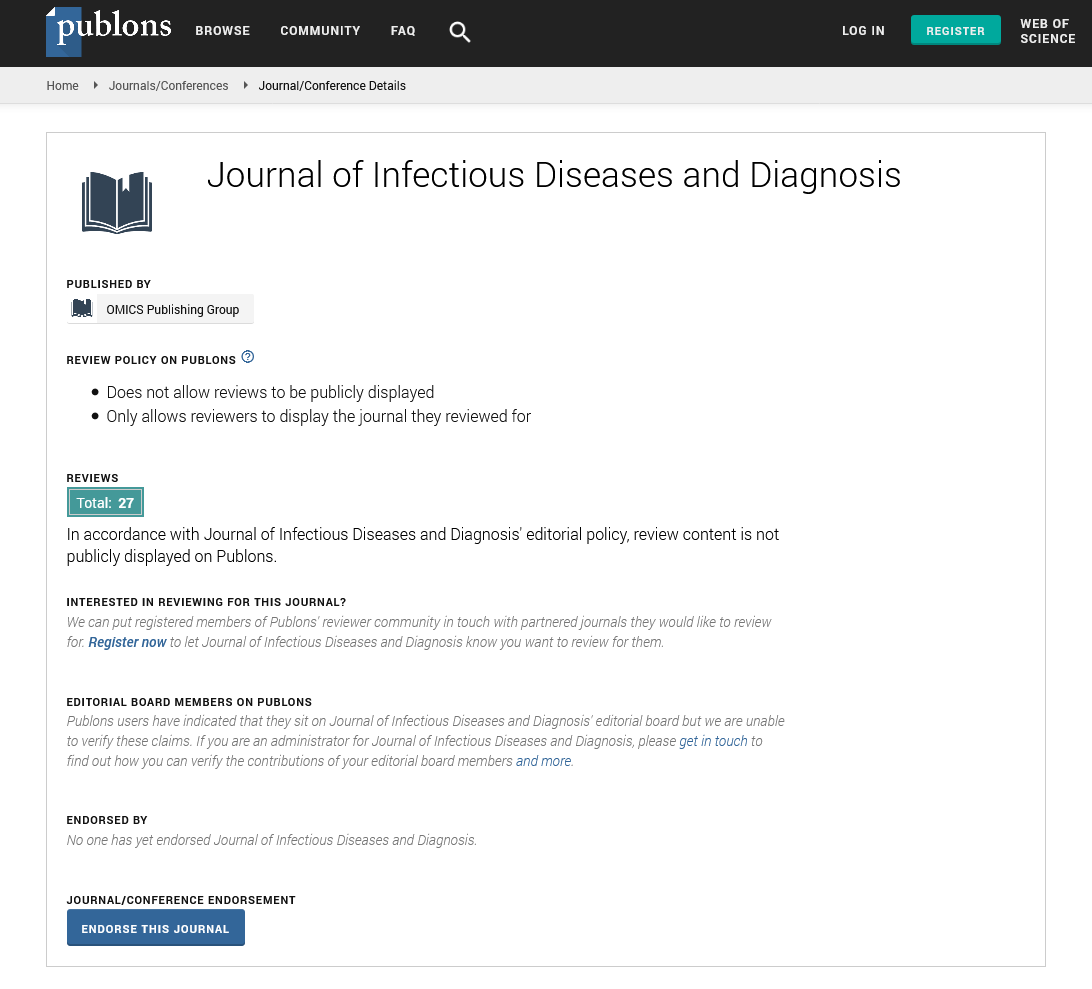Indexed In
- RefSeek
- Hamdard University
- EBSCO A-Z
- Publons
- Euro Pub
- Google Scholar
Useful Links
Share This Page
Journal Flyer

Open Access Journals
- Agri and Aquaculture
- Biochemistry
- Bioinformatics & Systems Biology
- Business & Management
- Chemistry
- Clinical Sciences
- Engineering
- Food & Nutrition
- General Science
- Genetics & Molecular Biology
- Immunology & Microbiology
- Medical Sciences
- Neuroscience & Psychology
- Nursing & Health Care
- Pharmaceutical Sciences
Perspective - (2024) Volume 9, Issue 5
Evaluation of Portable Diagnostic Devices for Rapid Detection of Tropical Infectious Diseases in Remote Areas
Xiang Chen*Received: 26-Aug-2024, Manuscript No. JIDD-24-26947; Editor assigned: 29-Aug-2024, Pre QC No. JIDD-24-26947 (PQ); Reviewed: 13-Sep-2024, QC No. JIDD-24-26947; Revised: 20-Sep-2024, Manuscript No. JIDD-24-26947 (R); Published: 27-Sep-2024, DOI: 10.35248/2576-389X.24.09.293
Description
Tropical infectious diseases, such as malaria, dengue fever and leprosy, remain significant health challenges in many remote and underserved regions. These diseases often require timely diagnosis and treatment to prevent complications and control outbreaks. However, remote areas frequently lack access to advanced medical facilities and diagnostic infrastructure, complicating efforts to manage these diseases effectively. Portable diagnostic devices offer a promising solution by providing rapid, accurate testing in locations with limited resources. These devices are designed to be compact, user-friendly and capable of delivering reliable results without the need for extensive laboratory equipment. The development and deployment of such portable diagnostics have the potential to greatly enhance disease management and improve health outcomes in remote areas. This article examines the role of portable diagnostic devices in the rapid detection of tropical infectious diseases in remote areas. It aims to highlight the advancements in portable diagnostics, evaluate their effectiveness in field settings and discuss the implications for improving healthcare access and disease management in underserved regions.
Portable diagnostic devices are designed to address the unique challenges of diagnosing tropical infectious diseases in remote and resource-limited settings. These devices incorporate various technologies to deliver rapid and accurate results, which are very important for effective disease management. Rapid Diagnostic Tests (RDTs) commonly used for quick detection of tropical diseases such as malaria and dengue fever. These tests typically utilize immunoassay techniques to detect specific antigens or antibodies in blood samples. RDTs are valued for their simplicity, ease of use and ability to provide results within 15-30 min. They are designed to be used in field conditions without the need for complex laboratory equipment. Portable molecular diagnostic devices, including those based on Polymerase Chain Reaction (PCR) technology, can detect the genetic material of pathogens with high sensitivity and specificity. Recent advancements have led to the development of compact, battery-operated PCR devices that can perform genetic testing in remote locations. These devices offer higher accuracy compared to RDTs but may require trained personnel for operation. Portable microscopy devices, such as handheld microscopes or digital microscopes, can be used for the visual identification of parasites and other pathogens. These devices are particularly useful for diagnosing malaria, where visual examination of blood smears is a standard practice. Advances in digital microscopy have improved the portability and ease of use of these devices.
One of the primary benefits of portable diagnostic devices is their ability to provide quick results. In remote areas, where transportation and access to healthcare facilities may be limited, rapid diagnostics are essential for timely intervention and treatment. Many portable diagnostic devices are designed to be user-friendly, with simple procedures that do not require extensive training. This ease of use is important in remote settings where healthcare personnel may have limited technical expertise. Portable devices are engineered to be rugged and durable, making them suitable for use in challenging environmental conditions. Their compact size and batteryoperated functionality allow them to be used in locations with limited infrastructure and electricity. Portable diagnostic devices often offer a cost-effective solution compared to setting up a full laboratory. They can be a more affordable option for lowresource settings, helping to extend diagnostic capabilities without significant financial investment.
While portable diagnostic devices are designed for ease of use, ensuring their accuracy and reliability is important. Devices must be rigorously tested and validated to ensure they perform correctly in field conditions and provide accurate results. Effective deployment of portable diagnostic devices requires adequate training for healthcare workers and support for device maintenance. Ensuring that personnel are properly trained and that devices are well-maintained is essential for maximizing their effectiveness. For portable diagnostics to be fully effective, they need to be integrated into existing health systems. This includes establishing protocols for data management, result reporting, and follow-up care. Portable diagnostic devices must meet regulatory standards and quality control measures to ensure their safety and effectiveness. Adherence to these standards is critical for gaining acceptance and trust in the healthcare community.
Conclusion
Portable diagnostic devices represent a significant advancement in the rapid detection of tropical infectious diseases in remote and resource-limited areas. By providing quick, accurate and user-friendly testing solutions, these devices have the potential to improve disease management, enhance healthcare access and support timely treatment in challenging environments. To maximize the impact of portable diagnostic devices, continued innovation and research are needed to address challenges related to accuracy, training and integration with health systems. Collaboration between technology developers, healthcare providers and policymakers will be essential to ensure that these devices are effectively deployed and utilized. The development and deployment of portable diagnostic devices offer a promising pathway to overcoming the barriers to effective disease management in remote areas. By connection between advanced diagnostics and underserved populations, these devices can play an important role in improving public health outcomes and advancing global efforts to control and prevent tropical infectious diseases.
Citation: Chen X (2024). Evaluation of Portable Diagnostic Devices for Rapid Detection of Tropical Infectious Diseases in Remote Areas. J Infect Dis Diagn. 9:293.
Copyright: © 2024 Chen X. This is an open-access article distributed under the terms of the Creative Commons Attribution License, which permits unrestricted use, distribution, and reproduction in any medium, provided the original author and source are credited.

